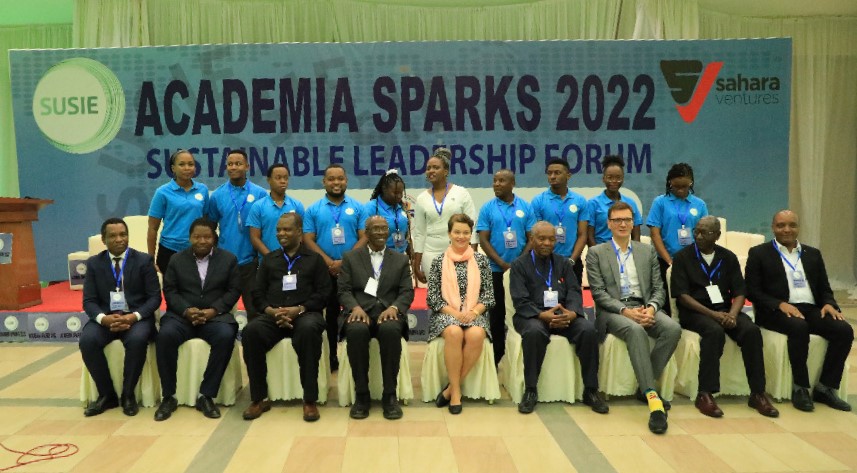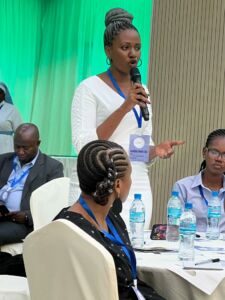Great SUSIE year 2022: Academia Sparks

Leaders and students at Academia Sparks 19.10.2022
The SUSIE year 2022 has been intense but because of the highly motivated project family, positive atmosphere and relevant goals, the project has been able to take huge jumps. In terms of teaching and learning the project invested in active e-pedagogy trainings and online course construction. As regards learning environment three business HUBs in MoCU, MWECAU and TUDARCo are ready to start in action in 2023 as well the institutional Moodle platforms where 10 online short courses are ready for students. These are remarkable steps and as regards the big picture, they improve learning and access to learning but also university working life interaction and overall relevance of higher education.
The last Sustainable leadership training session was conducted in August by Sahara Ventures CEO Jumanne Mtambalike who concentrated on Inclusive Leadership. Certificates were given to all 18 participants in the Academia Sparks Forum which closed the training on October 19th, 2022 in Dar es Salaam. Academia Sparks Forum gathered into the Kisenga LPDF Conference Center nearly 150 people from various society sectors to discuss the need for collaboration between universities, industry and business life, and innovation ecosystems, curricula reform and interactive leadership.
Welcome collaboration and co-creation
In the opening remarks of Academia Sparks Professor Sife, the Vice Chancellor of MoCU, reminded the audience that the number of universities in the continent of Africa has recently grown rapidly but higher education has several issues which could be solved by the collaboration between universities and private sector. Professor Karimuribo argued that the collaboration between Universities and Industry benefits both business life, graduates and society. In his presentation Re-engineering Tanzanian Universities Professor Burton LM Mwamila, the Provost of TUDARCo, maintained that
“co-creation between university and the industry is crucial in devising sound and feasible innovative solutions informed by research for existing problems in the society, thus changing the current state of Africa in the globe.”
Innovation, innovation, innovation
Vesa Taatila, Rector President of Turku UAS, noticed that
“we are in a world that is changing rapidly where innovation is part and parcel of the change. There is a need that we are part of that innovation that changes the world.”
SUSIE project leader Ritva Hyttinen argued that based on discussion in Sahara Sparks 2022, it seems that often Tanzanian universities are invisible in innovation ecosystems. Sari Uusi-Rauva, from the Embassy of Finland, encouraged Tanzanian universities to strengthen collaboration with innovation system actors. Moreover, she highlighted the importance of education in societal transformation and sustainable development. The audience, in turn, presented that universities should emphasise innovation capacity and raise it at the same level with teaching, learning, research and consultancy.
The panelists – Ms. Clara Danford, TURDACo Students’ Association; CEO Jumanne Mtambalike, Sahara Ventures; Prof. Didas Kimaro; MWECAU; Kennedy Rwehumbiza, Association of Tanzania Employers (ATE), Prof. Kisangiri Michael, Nelson Mandela African Institution of Science and Technology – agreed that innovative and entrepreneurship mindset are needed in every field, so they should be highlighted during studies. However, they reminded universities that entrepreneurs in rural areas should not be forgotten but they should be included in learning communities. Mr Siaphoro Kishimbo, Country Head of Human Resources of Nokia Plc, argued that the current long curriculum process of academia doesn’t meet industry. Industry must react on changes immediately and it has no time to wait for bureaucratic academic procedures.

Ms Danford, the representant of the TUDARCo Student’s Association
Sustainable Leadership
Professor Sife noted that leadership is not natural talent, but it requires skill and knowledge which can be studied as in the Sustainable Leadership training of SUSIE. In general, Sustainable Leadership refers to the model that aims at the sustainable future of organizations and it seeks balance between individuals, communities, economy and environment. The echoes of these aspects were heard in the three presentations of Sustainable Leadership training participants. Dr. Uiso, Director, Teaching and Learning (TURDARCo), presented that in terms of public funding Tanzanian universities are not equal. Although private universities are responsible for the huge number of graduates, their efforts are not recognized in public funding. Ms. Magoti, Head of ICT Department (MoCU), emphasized that the Sustainable Leadership should be implemented into Tanzanian universities. The new approach could improve responsible interaction between universities and communities and enable universities to renew their strategies for being increasingly student, industry and partner centred. Dr. Mkenda, Head of Department, Science Department (MWECAU), highlighted Results Based Management which is a holistic approach that integrates the strategies, resources, processes and measurement to improve decision-making to enhance the achievements of institutional strategic plans.
Sari Uusi-Rauva reminded the audience that the promotion of gender equity and in particular women leadership should be paid attention in universities because for any society to succeed the inclusion of women is key. However, mainly the leaders of the SUSIE partner Universities are men so in terms of gender equality we have still work to do!
Together we can do better
Academia Sparks was interactive and dialogue between the audience and presenters was enthusiastic. In closing remarks Prof. Philbert Vumilia, Vice Chancellor of MWECAU, summarized that the forum had highlighted the challenges universities are facing, and the possible solutions, yet the question ‘what is most practical for us remains unanswered’. He continued that the discussion presented a very good beginning as we seek the solutions for our problems and together we can do better. Prof. Vumilia saw that the different topics and the way they were presented paves a way for transformation. Again, youths ought to be societal problem solvers and the universities should be committed to embrace transformation.
Ritva Hyttinen, Turku UAS
